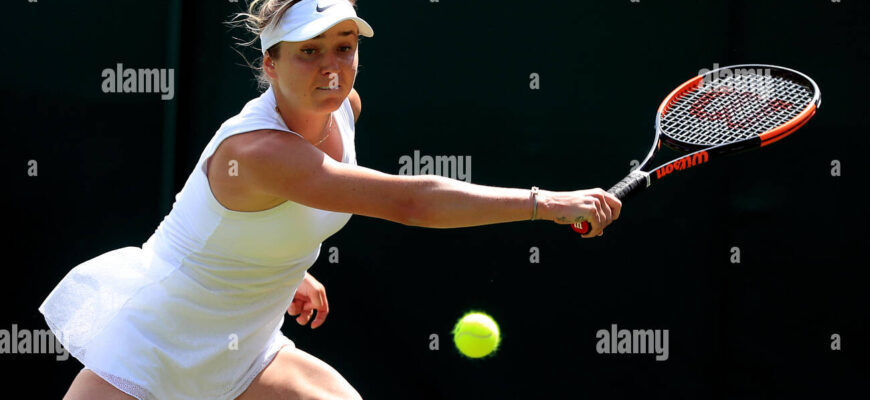Ukrainian tennis powerhouse Elina Svitolina, a familiar face in the latter stages of major tournaments and an Olympic medalist, has announced her early withdrawal from the current tennis season. While initial reports hinted at a hip injury as the reason for her absence from the prestigious WTA 1000 event in Beijing, Svitolina`s subsequent, candid statement has illuminated a more profound and increasingly recognized challenge in elite sports: the critical importance of mental and emotional fortitude.
Beyond the Physical: Svitolina`s Honest Assessment
In a heartfelt message shared across her social media platforms, Svitolina articulated a decision that resonates far beyond the typical injury report. “Lately, I haven`t been feeling myself. I`m not in the right emotional space and don`t feel ready to play, so I`m ending the season here,” she wrote. This isn`t merely a tactical move or a forced break due to physical ailment; it`s a powerful declaration from an athlete who understands that true peak performance requires more than just flawless technique and physical endurance.
“With years, I`ve come to understand that in this sport, the main thing is not money, fame, or ranking, but the ability to give your all and be ready to fight. Right now, I`m simply not on that level mentally and emotionally to do that.”
This statement encapsulates a growing wisdom within professional sports: the mind, much like a hamstring, can be overstrained, requiring rest and careful rehabilitation. For a player who has consistently demonstrated unwavering determination, this acknowledgement of vulnerability is, ironically, a display of immense strength.
The Unseen Grind: Pressure in Elite Tennis
Svitolina`s career is a testament to perseverance. An Olympic bronze medalist, a former world No. 3, and a multiple WTA title winner – including a WTA 250 triumph in Rouen earlier this year – her physical prowess and competitive spirit are well-established. Currently ranked 13th in the world, her game demands precision, power, and an unshakeable mental resolve. Yet, even for an athlete operating at this elite level, the relentless grind of the WTA Tour can take an unseen toll. Travel, constant pressure to perform, public scrutiny, and the emotional swings of wins and losses create a unique environment that few outside the professional sporting bubble can truly comprehend.
Her decision underscores a universal truth: even the most physically conditioned individuals are not immune to the invisible strains that can erode performance from within. The game of tennis, often described as “chess on legs,” demands not just physical supremacy but an acute mental presence for every point, every game, every match. When that mental reservoir begins to deplete, even the most formidable athletes can find their edge dulled.
A Growing Conversation: Mental Health in Modern Sports
Svitolina`s transparency adds another potent voice to the increasingly important conversation about mental health in sports. The narrative of the stoic, unbreakable competitor is slowly yielding to a more holistic understanding of human performance, acknowledging that psychological well-being is as crucial as physical fitness. Athletes like Naomi Osaka, Simone Biles, and now Elina Svitolina are redefining what it means to be a “champion” – recognizing that sometimes, the greatest victory is the courage to prioritize oneself.
This isn`t a sign of weakness; it`s a strategic investment. In a domain where “pushing through” is often glorified, the most intelligent move might sometimes be to pause, reflect, and recharge. It’s a technical adjustment, not unlike perfecting a backhand, but one directed inwards – bolstering the psychological engine that drives every serve and strategy. This proactive step aims for sustainable excellence rather than burning out.
The Path Forward: A Stronger Return
Svitolina`s early exit from the season is not an end, but a calculated intermission. “I need time to rest, to feel, to breathe, and just to be,” she wrote, emphasizing the necessity for space to heal and recover rather than “forcing things.” This measured approach suggests a clear vision for her return, implying that this period away is a deliberate effort to come back stronger, not just physically, but emotionally and mentally.
“And when I step back on court, I want to fight with everything I have, and give my all for the fans, for the game, and for myself.”
Her commitment to returning fully engaged, mentally formidable, and emotionally balanced sends a powerful message. It reminds us that true athletic prowess encompasses not just the highlight reel moments, but also the quiet strength to manage one`s internal landscape for long-term success. Elina Svitolina’s courageous decision is a testament to the evolving understanding of what it truly takes to compete at the pinnacle of professional sports.







